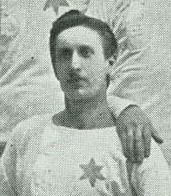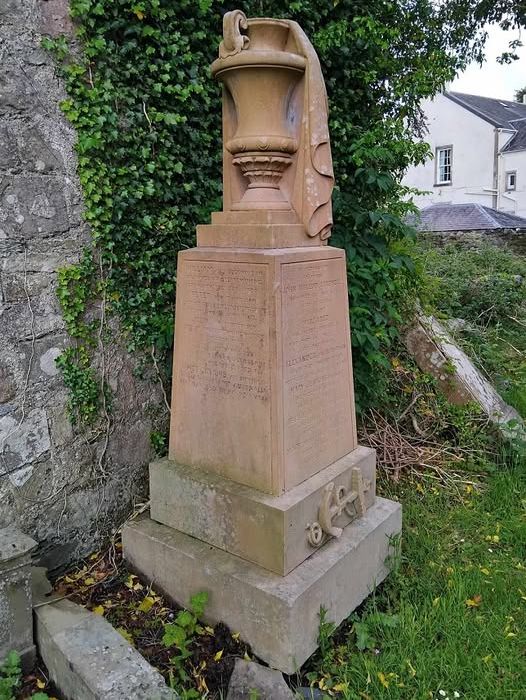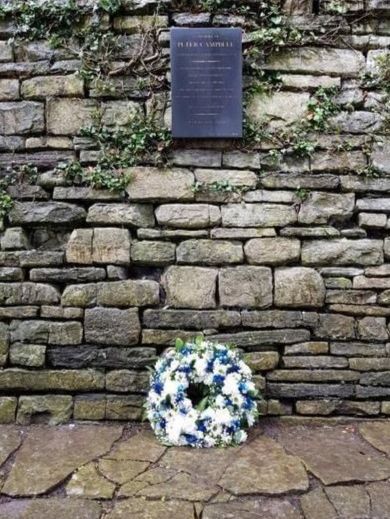Peter Campbell

Peter Campbell life was short. He died just a week or two shy of his twenty-sixth birthday, drowned in 1883 when the ship, carrying coal from Wales to India and on which he was one of the engineers, foundered in a storm in the Bay of Biscay.
It is also from his earliest years only really traceable by the huge contribution he made, albeit almost inadvertently, to Scottish football. By birth he was well-off. His mother was the daughter of Queen Victoria's surgeon. His father was a Ship's Master cum Harbour-master at Garelochhead. And it was there that his father, Peter, and, indeed, his elder brother, John, and younger brother, James, were all born, Peter in 1857.
However, whilst in 1881 John and James were both at home and at school Peter at fourteen was already on his way, to work first as an apprentice in the Clyde-side shipyards, eventually in 1882 qualifying as a Ships' Engineer. But in the meantime he had also carved a place in footballing perpetuity. In March 1872 a group of young men, just teenagers, got together and formed a football club, today's Glasgow Rangers. The why is unclear. Perhaps it had been inspiration from reports of the semi-final on the 5th of that month in London of the first FA Cup, in which Glasgow's Queen's Park had drawn with Wanderers, the team that, because of then then withdrawal of the Scots on ground of lack of funds, just eleven days later their English, erstwhile opponents went on to win. The how is clearer. The boys were William McBeath, Moses and Peter McNeil and Peter Campbell himself. McBeath lived across the landing from a McNeil elder brother. The McNeils grew up just down the water from the Campbells in Shandon. The boys, aged sixteen and seventeen, were contemporaries, Moses and Campbell almost exactly so. They were pals.
In fact Rangers and therefore Peter Campbell took a little time really to get going. The new club's first game was in May 1873, a goalless draw against fellow Glasgow club, Callander, that town being the birth-place of McBeath. But, whereas the opponents that day did, Campbell's, in fact the Campbells' club, with John and James also involved, failed to enter the first playing of the Scottish Cup in 1873. Only the following season was it there, knocked out in the Second Round by Dumbarton, perhaps a case of men against what were still boys. However, the team was maturing. Moses McNeil was its first international, in 1876 at twenty, as an outside forward. Campbell, an inside forward, had to wait two more years, being capped in 1878 and 1879 and scoring in both matches. And in the meantime Rangers in 1877 had reached and, after two replays and some controversy, lost the Scottish Cup Final. He again scoring.

(Mark Donnelly, with thanks)
It was probably the accumulation of these exploits that then produced some sort of offer from down South, by Blackburn Rovers. Certainly he spent the 1879-80 season in Lancashire and it has to be assumed it was in some fashion as a professional, possibly the English club's first. Yet his amateur status in Scotland remained untainted and for the 1980-81 season at least, possibly for another, he was back with The Gers. That is until the call of the sea became too strong and, ultimately, fatal.

With no body ever recovered there is no grave. But Campbell is well remembered. There is a family memorial, a cenotaph in Old St. Modan's Churchyard in Rosneath on lower Gareloch-side. And inestimable Rangers' Founders' Trail has also placed a memorial plaque in the Italian Gardens in Penarth, from where he had sailed on his final voyage.
Birth Locator:
1857 - "Craig Ellen", Garelochhead, Argyll/Dunbartonshire
Residence Locations:
1861 - Craig Ellen", Garelochhead, Argyll/Dunbartonshire
1871 - Glasgow
1881 - Kelvin, Glasgow (James boarding with Elizabeth, William, Peter & Moses McNeil)
1882 - 2, Parkgrove Terrace, Glasgow
Death Locator:
1883 - Drowned in the Bay of Biscay, living at Garelochhead
Burial Locator:
Cenotaph: St. Modans Church, Rosneath
Plaque: Italian Gardens, Penarth, South Wales
Back to Gareloch and Rhu,
or the SFHG Home page